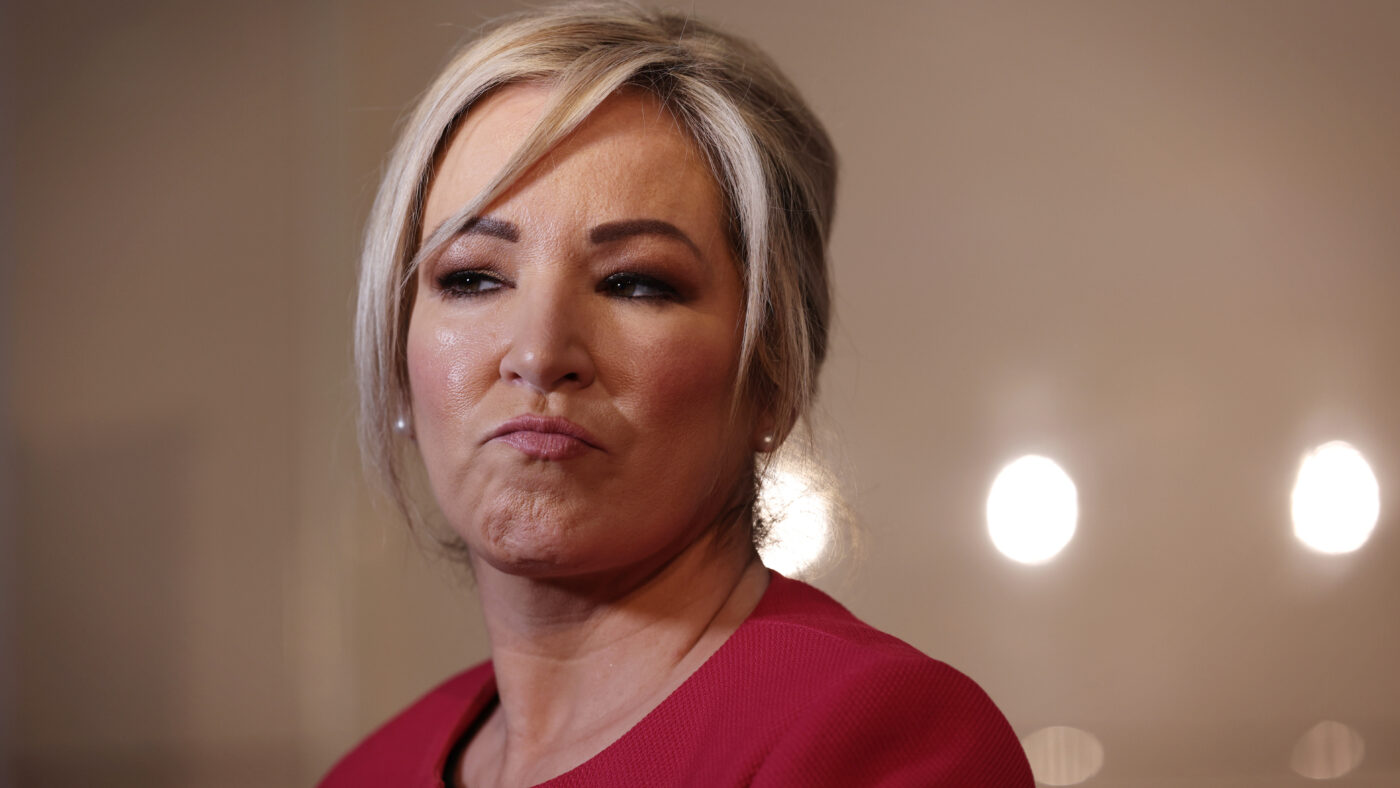The Stormont Assembly has now completed its first week back at work, amid a giddy, almost celebratory mood in the Parliament Buildings. As the editor of Northern Ireland’s unionist daily newspaper, the News Letter, pointed out in a recent column, it almost felt as if opposition to the Irish Sea border had never existed.
Surrounded by this atmosphere, Michelle O’Neill was confirmed as the province’s new first minister during a special sitting of the Assembly on February 3. After the previous Stormont election, Sinn Fein’s propagandists tried to imply that the DUP had blocked Mrs O’Neill’s appointment because she was a Catholic and a nationalist. That lie was finally buried.
Of course, many unionists are genuinely appalled that their region is now led nominally by a Sinn Feiner. That has more to do with the fact that the party’s ‘northern leader’ views her late father, a former IRA prisoner, as a political role-model and claims that there was ‘no alternative’ to the terrorist group’s campaign of violence. Even more damningly, police forces in both Northern Ireland and the Republic believe that Sinn Fein is still directed by the IRA’s ‘army council’.
Nevertheless, as part of the power-sharing arrangements, the first minister’s position at Stormont carries identical or ‘co-equal’ powers to the deputy first minister’s role. This job was taken by the DUP’s Emma Little-Pengelly, a barrister and staunch supporter of Sir Jeffrey Donaldson.
In fact, it was the unionist party leader who won Little-Pengelly’s seat at the last election, in 2022. Under the rules of Northern Ireland’s devolved institutions, a party can ‘co-opt’ a replacement MLA if one of its elected members steps aside.
This regulation has been used prolifically, producing some manouevres that would make Putin and Medvedev blush. And in the absence of a working Assembly almost two years ago, Sir Jeffrey simply decided to keep his Westminster seat and hand his newly acquired mandate at Stormont to Mrs Little-Pengelly.
That’s the way that democracy works in this part of the UK. Another reliable feature of devolution is that the political parties, which are divided on almost every other issue, all agree heartily that the Treasury at Westminster does not give them enough money.
The government seemed to anticipate this complaint before Christmas, when it negotiated a financial settlement with Ulster’s politicians at Hillsborough Castle. It claimed that a £3.3bn lump sum would effectively bail out Northern Ireland’s ailing public services.
The deal also involved setting a new ‘fiscal floor’, calculated on a ‘needs based’ basis, that would ensure 24% higher public spending in NI per head than in England. As generous as that seemed, the new Assembly wasted no time last week passing a motion, unanimously, demanding yet more funds from Westminster. The new financial settlement, it said, was already inadequate.
It is true that public sector pay in Northern Ireland has fallen behind equivalent salaries in the rest of the United Kingdom. During widespread strikes in the province, many workers, like teachers, paramedics and nurses, demanded ‘pay parity’ with their counterparts nationwide.
At the same time, this situation was created by many years of irresponsible government at Stormont, as well as long periods when power-sharing failed to operate.
In Northern Ireland, the public sector is bigger, comparatively, than in the rest of the UK, accounting for 27% of jobs as against 18% on the mainland. The government at Westminster has repeatedly urged the devolved executive to implement reforms, but its pleas have been largely ignored.
Worse than that, previous administrations at Stormont refused stubbornly to consider balancing their books by introducing revenue raising measures that are commonplace in the rest of the UK.
In November, the secretary of state for Northern Ireland, Chris Heaton-Harris, asked departments in the province’s civil service to prepare public consultations on, ‘measures to support budget sustainability’. These proposals included introducing water charges, stopping free prescriptions and removing free public transport for all over-60s.
Many commentators interpreted Chris Heaton-Harris’s intervention as a threat, designed to scare the DUP back into Stormont and force it to accept a deal with the government. However, it also challenged decades of fiscal populism, during which devolved ministers in Belfast liked to give out freebies, duck difficult choices and resist new costs that the rest of the country took for granted.
Whenever their budgets did not balance, it was always possible to shirk responsibility and blame the penny-pinchers in London.
These previous executives were led, at least nominally, by unionists, who sometimes liked to portray themselves as fiscal conservatives and advocates of free market enterprise. Now, more than half the Assembly is made up of self-styled ‘progressives’. And that group is dominated by Sinn Fein, which espouses an incoherent form of left-wing populism that is the opposite of responsible government.
At Westminster, successive secretaries of state have spurned the chance to take responsibility for Northern Ireland and reform public services in the absence of devolution. Due to those decisions, now that Stormont is back, we can expect all the old habits of waste, greed and irresponsibility to ensure that the province remains a poorly governed, expensive burden to the Treasury.
Click here to subscribe to our daily briefing – the best pieces from CapX and across the web.
CapX depends on the generosity of its readers. If you value what we do, please consider making a donation.


